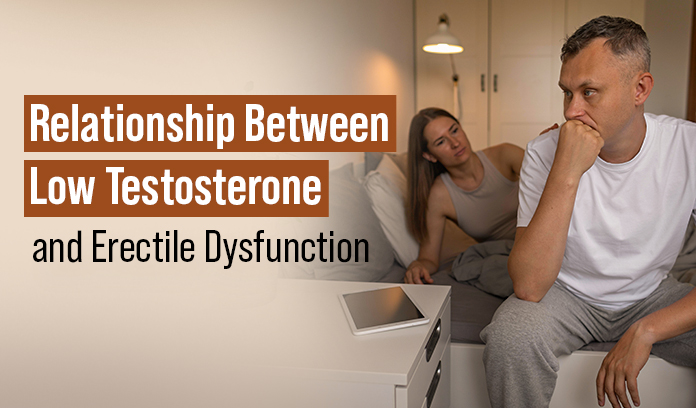What is Testosterone?
A hormone called testosterone is primarily produced in the man’s testicles and, to a lesser extent, in the women’s ovaries and adrenal glands. It is often referred to as the “male hormone” because it plays an important role in male sexual development and reproductive functions. Maintaining libido, sperm production, muscle mass, bone density, and overall energy levels all depend on testosterone.
Low Testosterone and Erectile Dysfunction:
Low testosterone levels, also known as hypogonadism, can lead to a range of symptoms such as fatigue, reduced sex drive, difficulty achieving or maintaining erections, and even depression.
Research has shown a clear connection between low testosterone and erectile dysfunction. Testosterone stimulates the production of nitric oxide, a molecule that helps relax the blood vessels in the penis, allowing for increased blood flow during sexual arousal. Insufficient testosterone levels can hinder this process, making it difficult to achieve or sustain an erection.
Low testosterone can also contribute to the development of other underlying conditions that further impact erectile function, such as obesity, diabetes, and cardiovascular disease, all of which are known to be risk factors for erectile dysfunction.
Diagnosis and Treatment:
It is important to consult with a healthcare expert if you suspect low testosterone may be contributing to your erectile dysfunction. They may conduct a blood test to measure your testosterone levels and will help evaluate your symptoms. If diagnosed with low testosterone then there are treatment options available to help regenerate hormonal balance and improve erectile function.
Testosterone replacement therapy (TRT) is a common method of treatment for low testosterone. It involves delivering testosterone by injections, patches, gels, or pellets. TRT can help enhance testosterone levels and improve libido and overall sexual function. However, it is crucial to undergo TRT under the care of a qualified healthcare expert, as it may have potential risks and side effects.
Lifestyle Changes and Coping Strategies:
Some lifestyle changes can also help improve erectile function in men with low testosterone. Maintaining a healthy weight, partaking in regular physical exercises, reducing stress levels, and getting adequate sleep are all beneficial for hormonal balance and sexual health.
Furthermore, having open communication with your partner and seeking support from a healthcare expert or counselor can significantly help you cope with the emotional aspects of erectile dysfunction. Understanding that ED is a medical condition and not a reflection of one’s masculinity is important in managing the psychological impact it may have on men and relationships.
Conclusion
Low testosterone levels are strongly linked to erectile dysfunction. Understanding this connection helps men seek medical attention and explore treatment options to improve sexual health. Consulting healthcare professionals, undergoing tests, and considering lifestyle changes can help regain control over their sexual function and enhance overall well-being. Open communication, seeking a healthcare expert’s support, and a positive outlook are essential in dealing with erectile dysfunction.

